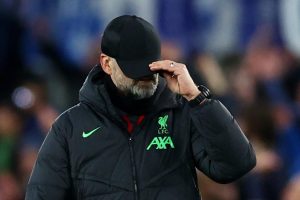
Sign up to Miguel Delaney’s Reading the Game newsletter sent straight to your inbox for free
Sign up to Miguel’s Delaney’s free weekly newsletter
First Mario Zagallo, then Franz Beckenbauer. Within a few days, football’s most distinguished club has been reduced to a lone, living member. Only Didier Deschamps is left of the select band who won the World Cup as both player and manager. Even in illustrious company, Beckenbauer had a capacity to stand out: like Deschamps, he was not merely part of a glorious team but a World Cup-winning captain.
Beckenbauer was a triple European Cup-winning captain, too, a record he shares with Sergio Ramos. He reached four World Cup finals, losing as well as winning as both player and manager. In his ‘other’ World Cup, in 1970, it took arguably the competition’s greatest semi-final to deny him a fifth final: Italy 4-3 West Germany. Even when he went to Hamburg in his mid-thirties, he won a Bundesliga title that allowed them to become European Cup winners. He only dabbled in club management and yet still won league titles in two countries and a Uefa Cup. Wherever he turned his attentions, Beckenbauer was the constant on the biggest of stages, the byword for success, the regal figure who gravitated to the top. His nickname of Der Kaiser conveyed an imperial authority; so did Beckenbauer the footballer: he started off running games from midfield, then did so from sweeper and then ruled from the technical area.
Even with the stain of sleaze, with Fifa politicking and the allocation of the 2006, 2018 and 2022 World Cups, and a 90-day ban for refusing to cooperate with a corruption inquiry, Beckenbauer’s achievements far outweighed his failings. He was the dominant, defining individual in shaping German football: he had a huge direct impact in five decades, from the 1960s to the 2000s, and his influence and legacy lives on.
Beckenbauer’s Germany defeated Johan Cruyff’s Netherlands in the 1974 World Cup final
(EPA)
Bayern Munich’s status as the German superclub owe much to Beckenbauer: they were only champions of their country once before he debuted and no Bundesliga club had won the European Cup before their trio of triumphs in the 1970s. West Germany had one, improbable, World Cup win before Beckenbauer, but as underdogs in 1954: his side of the 1970s, however, were a genuine superpower, European champions in 1972, runners-up in 1976. Perhaps their 1974 final victims, Johan Cruyff’s Netherlands, were more beloved, more influential in the thinking today while Beckenbauer’s side created the image of the Germans as the bogeymen who invariably prevailed in the end; yet Helmut Schon’s side could play their brand of total football, with a sweeper who strolled out from the back.
Beckenbauer’s position could make him an anachronism: certainly in the days of high pressing and high defensive lines, fewer sides have a spare man behind everyone else. It did render him an anomaly: no other defender has won the Ballon d’Or more than once. And if Beckenbauer was more creator than stopper, his positioning could bemuse the uninitiated. “Tell the Kraut to get his ass up front,” a New York Cosmos executive said during his time in the United States. “We don’t pay a million for a guy to hang around in defence.”
Beckenbauer did have sufficient goalscoring talent to score seven international goals in 1966 alone: none in its most famous final, the first of two World Cup games when he and Bobby Charlton were deputed to man-mark each other; if it felt a waste, the German struck in their 1970 rematch, changing the game with force of personality as well as talent.
The German was one of only three men to lift the World Cup as a player and manager
(Bongarts/Getty Images)
Beckenbauer’s death, like Charlton’s, signifies an era coming to an end. Of the three great Germans who won everything for club and country, who were preeminent in their positions, only Sepp Maier remains. Gerd Muller, the deadliest of finishers, German efficiency on a footballing field, reached his end before Beckenbauer.
Euro 2024 will bring the 50th anniversary of West Germany’s World Cup win; half a century on, there is a strong case that Beckenbauer retains his place in an all-time 11. Certainly his importance was reflected by a successor who was born not only after Beckenbauer’s playing career, but after he had steered West Germany to the 1986 World Cup final, who is far too young to remember the 1990 World Cup win in a tournament when they were the most consistent, powerful and dominant side.
“For me, Franz Beckenbauer was the best footballer in German history,” said Julian Nagelsmann. “His interpretation of the role of the libero changed the game, this role and his friendship with the ball made him a free man. Franz Beckenbauer was able to float on the lawn, as a footballer and later also as a coach he was sublime, he stood above things. When Franz Beckenbauer entered a room, the room lit up. An aura surrounded him until the end.”
Now Beckenbauer has reached his end. But as Karl-Heinz Rummenigge said: “Franz Beckenbauer rewrote the history of German football and left a lasting mark on it. German football has lost the greatest figure in its history.”






